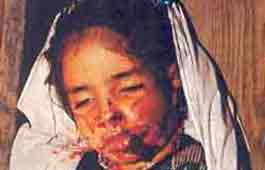By : Koshur Mazloom
Obama and Sarkozy Discuss About Taliban
Obama:
To the warning of the world, Bush paid no heed,
The pangs of his venture, now I am unable to bear.
Sarkozy:
You echo the voice of my heart, my dear friend, !
This Blair legacy has brought laughter and jeer.
Obama:
But as mighty nations, we are to save our grace,
Coming empty , we will lose all our awe and
fear.
Sarkozy:
Our army says, they are giants in human shape,
For them, mountains and rivers are no barrier.
Our commanders tremble while narrating the tale,
'These Talibans fight with smile, and die with cheer.
Obama:
I have used all the wiles, my mind could conceive,
I deployed Pak-Afghan stooges from front and rear.
Our media gave their profile as most demonic race,
To our misfortune, all this made their tide stronger.
Sarkozy:
History traces millions of our graves in that land ,
Russians have the memory even darker and bleaker.
This time we believed in NATO and your drones,
To erase the past stigma, and open a new chapter.
Obama:
Our weapons and drones have yielded no result,
The death of innocents has exposed
us to sneer.
When we think, our bombs finished their creed,
They emerge again, with a spirit, bolder and purer.
Sarkozy:
I confide in you brother, my generals have told,
‘They bury their dead with eyes having no tear.
I am convinced from what I have heard and seen,
Each drop of their blood produces a new warrior.
Obama:
I think it sagacious to discard these brutish folk,
And declare our move as a humanitarian gesture.
We both must call it the folly of
Bush and Blair,
And pretend, we are peaceful and morally superior.
Sarkozy:
I admire your genius, and endorse your views,
If we fail to withdraw , our future is drearier .
Obama and Sarkozy Discuss About Taliban
Obama:
To the warning of the world, Bush paid no heed,
The pangs of his venture, now I am unable to bear.
Sarkozy:
You echo the voice of my heart, my dear friend, !
This Blair legacy has brought laughter and jeer.
Obama:
But as mighty nations, we are to save our grace,
Coming empty , we will lose all our awe and
fear.
Sarkozy:
Our army says, they are giants in human shape,
For them, mountains and rivers are no barrier.
Our commanders tremble while narrating the tale,
'These Talibans fight with smile, and die with cheer.
Obama:
I have used all the wiles, my mind could conceive,
I deployed Pak-Afghan stooges from front and rear.
Our media gave their profile as most demonic race,
To our misfortune, all this made their tide stronger.
Sarkozy:
History traces millions of our graves in that land ,
Russians have the memory even darker and bleaker.
This time we believed in NATO and your drones,
To erase the past stigma, and open a new chapter.
Obama:
Our weapons and drones have yielded no result,
The death of innocents has exposed
us to sneer.
When we think, our bombs finished their creed,
They emerge again, with a spirit, bolder and purer.
Sarkozy:
I confide in you brother, my generals have told,
‘They bury their dead with eyes having no tear.
I am convinced from what I have heard and seen,
Each drop of their blood produces a new warrior.
Obama:
I think it sagacious to discard these brutish folk,
And declare our move as a humanitarian gesture.
We both must call it the folly of
Bush and Blair,
And pretend, we are peaceful and morally superior.
Sarkozy:
I admire your genius, and endorse your views,
If we fail to withdraw , our future is drearier .











